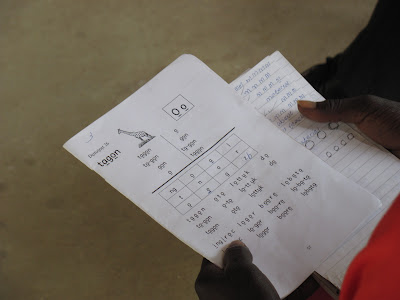Greetings from the armpit of South
Sudan, the newest capitol
city in the world, Juba!
I arrived here early last
week (in an air conditioned Land Cruiser, no less!!!) for a two week SIL, mother
tongue literacy training.
The primary focus for this
training has been aimed at equipping national teachers and teacher trainers
with the skills needed to properly teach a newly created vernacular primer.
Though a Didinga alphabet
was somehow created in the1920’s,
very little Didinga literature was ever distributed and few, very few, Didinga could be considered
literate in their mother tongue.
The ability to read for
meaning and the importance of expressing ones ideas, thoughts and feeling in
ones first language are skills which magnitude can’t be overlooked.
 | |
| My classmate, Lino, teaching in Didniga. This man cracks me up! |
 |
| Reading a Didinga story to my training class! |
 |
| Dinka's written language. |
 |
| My workshop classmates and I - the workshop was made up of men from Didinga, Dinka, Baka and Tennet tribes... oh and, me. |
 | |
| While in Juba, I literally dreamt about the Didinga alphabet. |
 |
| One of the Tennet mother tongue primers. |
In the past, my
Didinga students have not only been faced with the incredible challenge of learning what
reading is, in an environment that is almost entirely void of written
text (things like children books, road signs, cereal boxes, written recipes,
magazines, texts… are just not there), but these students have also had to deal with learning how to read in a second language, a language which
they just happen to be simultaneously learning!!!
Imagine!
SIL (Summer Institute of
Learning), working in conjugation with Didinga Nationals, have not only adapted the Didinga alphabet, but also have created a 1st class mother tongue primer.
SIL is also working towards
completing the New Testament in Didinga, which is, in essence, the true
foundation for all mother tongue literacy work.
After nearly 2 weeks of attempting
to read and write with a foreign alphabet and teach strictly in Didinga, I am
all too aware of the importance of mother tongue literacy!
Can you imagine never having
the opportunity to read your Bible in your mother tongue?
Perhaps, it is hard to
really understand the joy and heart connections to be found in our mother
tongue languages – until we have been frustrated and humbled with attempting to
muddle our way through another’s.





No comments:
Post a Comment